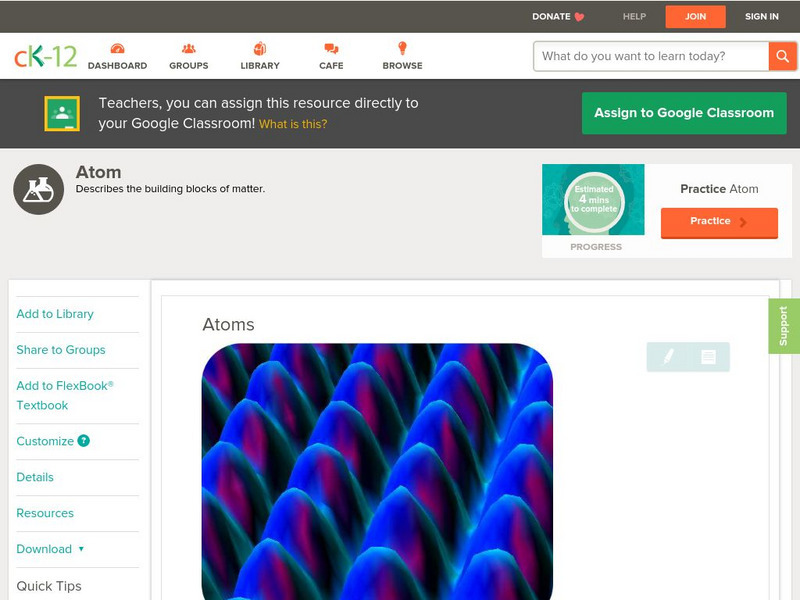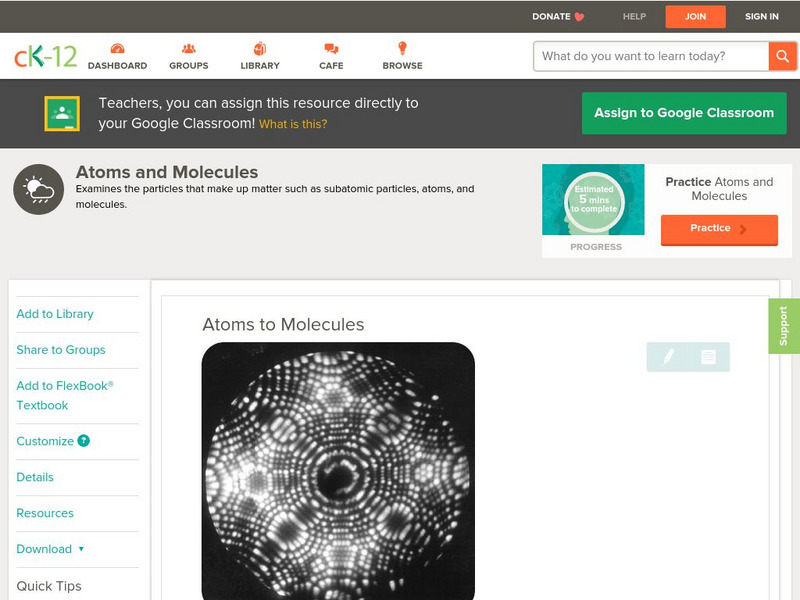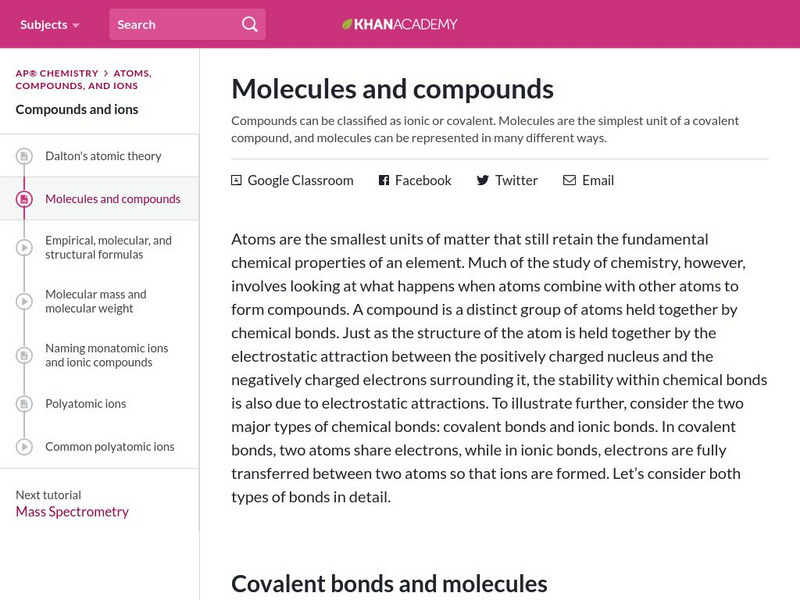Hi, what do you want to do?
Curated OER
Pauli's Magical Water
Students predict the shape of molecules using VSEPR theory. In this chemistry instructional activity, students differentiate a polar and nonpolar molecule. They discuss why water's polarity is very important.
Curated OER
Putting on Mass: Just how do Trees grow?
Students articulate an explanation of photosynthesis. They identify problems they have with comprehension of how a plant gains mass. Students describe a historical experiment.
Curated OER
Electrons
Students discover that there are many facets to the electron in chemistry such as electron cloud. They view movies an animations of electrons. Students visit links pertaining to electrons.
Curated OER
Grating Spectrometer
Learners calculate the Balmer series. In this physics lesson, students observe hydrogen lamp spectra using spectrometers. They calculate wavelength and compare them with their theoretical calculations.
Curated OER
Explorit's Chemistry Quiz
In this chemistry worksheet, students complete a six question multiple choice quiz about chemistry. This is an on-line interactive worksheet.
Curated OER
Water Chemistry
Middle schoolers engage in a lesson that is concerned with the concept of water chemistry. They conduct research using a variety of resources. Students also consider an experiment to observe how water has the abiility to exist as three...
Curated OER
Jupiter's "Monstrous" Magnetosphere
Students explore Jupiter's magnetosphere. In this Jupiter lesson plan, students examine a diagram of the magnetic field that surrounds Jupiter.
Curated OER
The Great Gas Race
Fourth graders improve their understanding of Graham's Law by using properties of gases to evaluate the rate of effusion of two compounds as they vaporize. They engage in a lab which elevates their understanding of the properties of gases.
Curated OER
Classifying Matter Game
Students identify the different states of matter. In this chemistry lesson, students differentiate the physical properties of the three states. They apply what they learned by playing a team game at the end of the lesson.
Curated OER
Energy Dispersive Spectroscopy
Students calculate the values of electron binding energies. In this physics lesson, students solve for different wavelength characteristics of X-rays. They present their findings to the class.
CK-12 Foundation
Ck 12: Earth Science: Atoms to Molecules Study Guide
Understand the basic structure of atoms and molecules in the Earth's crust.
Concord Consortium
Concord Consortium: Science of Atoms and Molecules: Nucleic Acids and Proteins
Through this activity, students work with macromolecules, proteins and nucleic acids. The focus is on the atomic structure of proteins, how linear polymers are made, and the surface charges of the resulting polymers. . Multiple-choice...
Texas Education Agency
Texas Gateway: Atomic and Molecular Explanation of Pressure and Temperature
Learn how to calculate the kinetic energy of a gas molecule, describe the relationship between the temperature of a gas and the kinetic energy of atoms and molecule, and describe the distribution of speeds of molecules in a gas. The...
Concord Consortium
Concord Consortium: Stem Resources: Electrons in Atoms and Molecules
A module with animations, explanations, and questions about the importance of electrons in the structure of an atom. Understand the definition and locations of electrons in the atom. Explore the role of electrons in bonding, polarity,...
CK-12 Foundation
Ck 12: Physical Science: Atoms
[Free Registration/Login may be required to access all resource tools.] Atoms and how they are related to elements, and the particles that make up atoms.
Thomas Jefferson National Accelerator Facility
Jefferson Lab: Atoms, Elements and Molecules: Questions and Answers
Read common questions and answers about atoms, elements and molecules.
CK-12 Foundation
Ck 12: Earth Science: Atoms to Molecules
[Free Registration/Login may be required to access all resource tools.] Examine the composition of matter.
CK-12 Foundation
Ck 12: Earth Science: Atoms to Molecules
[Free Registration/Login may be required to access all resource tools.] Examine the composition of matter.
CK-12 Foundation
Ck 12: Atoms to Molecules
[Free Registration/Login may be required to access all resource tools.] Examine the composition of matter.
Utah State Office of Education
Utah Science: Matter
Discover atoms and molecules which make up matter, motion of atoms and how to measure the mass, volume and density of matter.
Khan Academy
Khan Academy: Molecules and Compounds
Article defines and explains compounds which are either ionic or covalent and molecules which are the simplest unit of a covalent compound. Molecules can be represented in many different ways.
Utah State Office of Education
Utah Science: It All Adds Up!
Atoms and molecules come together to create matter. What happens to the weight of matter when it is frozen? Can matter be destroyed? Check out these activities to clearly understand how this works.
Science Buddies
Science Buddies: Study Chirality With a Homemade Polarimeter
Some molecules can be either left- or right-"handed." The left- and right-handed molecules have the same number and type of atoms, and their chemical structures look identical, but they are actually mirror images of each other. Many...



























